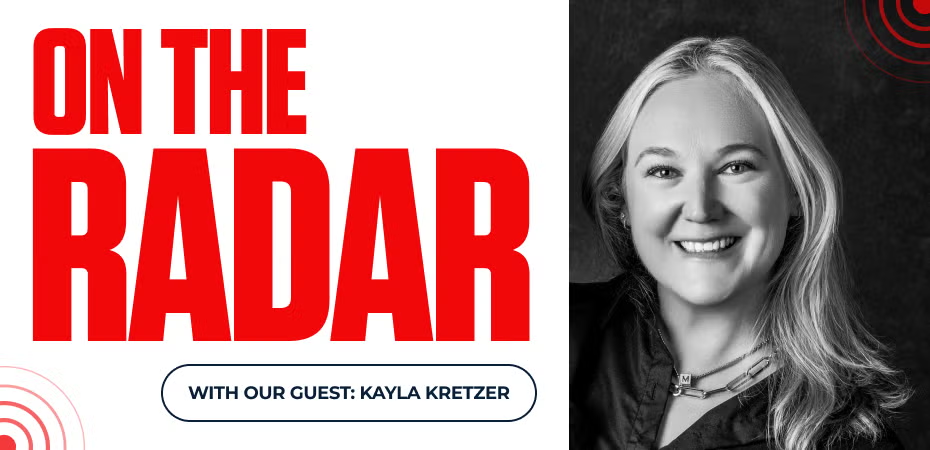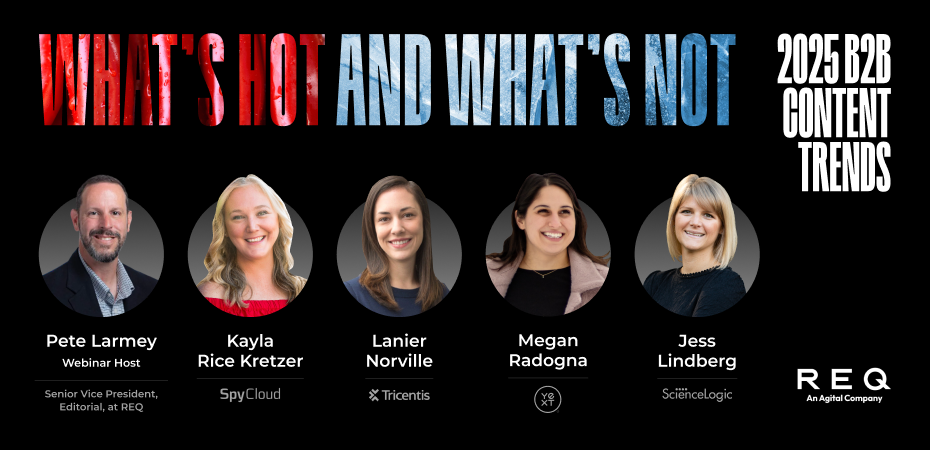June 11, 2025
| Article | by Katie Hanusik | Branding,
Content,
Public Relations,
Social Media
Driving Cybersecurity Awareness with Data: A Conversation with SpyCloud’s Kayla Kretzer

At REQ, we have the privilege of partnering with some of the most forward-thinking brands in tech. One standout collaboration has been with SpyCloud, a cybersecurity firm known for its unmatched access to cybercrime data and intelligence and its commitment to holistic identity threat protection.
At the center of this collaboration is Kayla Kretzer, SpyCloud’s communications leader, who recently steered a bold, research-driven content campaign. We sat down with Kayla to discuss how she and the SpyCloud team developed and executed their strategic approach – from vision and implementation to innovation and results.
REQ: What was the vision behind your campaign, and who were you trying to reach?
Kayla Kretzer:
A major brand goal we have for SpyCloud is to continue to hold our authority in recapturing darknet data and providing insights into what identity data exposures mean for businesses and their value in the criminal ecosystem. The way we do this is through distilling our billions of recaptured data assets into digestible flagship reports – the Malware & Ransomware Defense Report and Identity Exposure Report. These reports are cornerstone research resources, released annually, that use proprietary data to expose emerging threats like infostealer malware, phishing attacks, session hijacking, and ransomware and are crafted with unique angles on the data we’ve analyzed that are relevant and timely to our core targets and industries.
Our primary audiences are Fortune 1000 security decision-makers, U.S. government security professionals and cybersecurity journalists with a goal of both earned media and Tier 1 lead generation. Every tactic was aligned with reaching these audiences.
REQ: What strategy did you implement, and how did research influence your choices?
Kayla Kretzer:
Research was at the heart of our strategy. We started with deep analysis of SpyCloud’s recaptured breach, malware and phished data – billions of stolen credentials, PII, financial data and infostealer logs. From there, we zeroed in on trending identity-based threats, crafting narrative-rich, media-worthy reports and supporting materials like blogs, infographics, videos and more.
The dual goals were to strengthen our brand’s authority and to increase awareness among high-value enterprise and government audiences. Each report featured clear year-over-year benchmarks, standout stats, and sector-specific insights to enhance newsworthiness. We even verticalized our pitches to key industries like insurance and healthcare to maximize media pickup. And I’d be remiss not to speak to the unique visual experience of these reports to showcase our analysis in new and engaging ways and stand out in a sea of standard charts and graphs of others in our industry.
REQ: Can you walk us through the execution — what worked, what barriers did you overcome?
Kayla Kretzer:
We tackled the crowded cybersecurity news cycle by differentiating both content and distribution. For example, we issued two distinct press releases for the malware report — one technical, one narrative. This dual approach boosted our visibility across security and business media.
For the Identity Exposure Report, we took the success of the previous approach and doubled-down with a new angle: targeting broadcast media with consumer-friendly storylines like password reuse and cyber hygiene best practices. This landed us placements on NBC News Radio and Issues Today Radio, with nearly 2 million impressions and 96 regional pickups.
Our success came from pairing rich, original data with media-savvy packaging and exploring non-traditional channels like radio and segmented pitching.
REQ: What kind of results did you see — and how did this campaign impact SpyCloud?
Kayla Kretzer:
We saw 210 media placements in total – including top outlets like Dark Reading, SC Media, IT Brew, and Consumer Affairs. Our Share of Voice (SOV) on ransomware topics increased 14x. The visibility translated directly into a surge in high-intent leads and new business opportunities.
We tracked success using MuckRack, Share of Voice reports, and internal CRM tools to tie coverage back to demo requests and deal creation. Our campaign clearly aligned with company growth objectives and positioned us as a go-to authority in identity and cybercrime threats like malware.
REQ: What are the most innovative or creative elements of a research-heavy outreach program?
Kayla Kretzer:
We are always looking for ways to challenge the norm in how our research is delivered and distributed. We want to be more than a stat or data point but really tell a bigger story. In tandem with our goal of brand authority, our team uncovered fresh, attention-grabbing narratives from SpyCloud’s recaptured data and in-house expertise — like criminals using Meta’s Threads to sell stolen credit cards, and China’s surveillance state selling citizen data online. These stories weren’t driven by press releases – they were editorial exclusives crafted in partnership with REQ and our research team.
We also broke new ground with a radio media tour and the aforementioned innovative press release strategy – tactics that proved so successful, they’re now part of our ongoing playbook.
REQ: Final thoughts — any lessons learned or advice for others using research in PR?
Kayla Kretzer:
Be bold with your data. The more original and aligned your insights are with current trends (in our case security), the more likely you are to cut through the noise. And don’t underestimate the power of packaging – strong storytelling turns good research into great PR.
Also, diversify your channels. Taking chances that are outside traditional approaches, like solely relying on releases, and mixing trade coverage with broader consumer or general interest exposure, helped us drive leads from multiple angles and reach audiences well beyond the cybersecurity bubble.
Kayla and the SpyCloud team proved that even in a saturated media environment, innovative storytelling backed by data can drive measurable business results and establish lasting authority. At REQ, we’re proud to be their partner in this journey – and excited to see what’s next.
